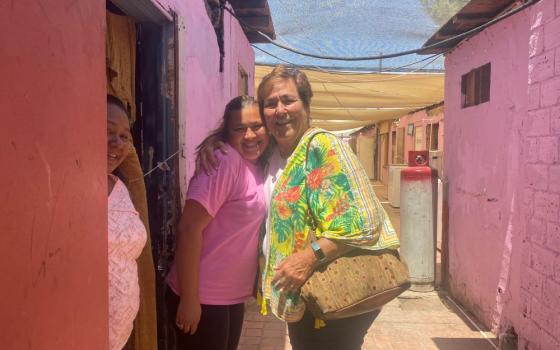By JOHN L. ALLEN JR.
Lisbon, Portugal
Christianity’s love-hate relationship with secularism is a core theme of Benedict XVI’s four-day trip to Portugal, and this evening he asked an especially evocative question: In a social context in which basic Christian belief can’t be taken for granted, is the church too worried about structures and power and not enough about the fundamentals of the faith?
The pope raised that query, without quite supplying an answer, during an open-air Mass for an estimated 80,000 people in Lisbon’s Palace Square. It’s certainly an evocative spot to contemplate the demise of Europe’s once-intact Catholic cultures: It was here in 1908 that the penultimate Catholic monarch of Portugal, Charles I, was assassinated in 1908, with the erection of a secular republic not far behind.
Coming into his Portugal swing, many observers expected Benedict to challenge a gay marriage law recently passed by the Portuguese parliament and currently awaiting action by President Anibal Cavaco Silva. So far, however, the pope has resisted being drawn into specific political debates, focusing instead on the deeper question of how to keep the flame of the faith alive in a secular world.
In his homily this evening, Benedict seemed to propose a focus on the fundamentals: forming passionate Christians one-by-one, rather than trying to sustain huge bureaucracies or waging power struggles. In a sound-bite, the recipe offered by Benedict for life in a secular world turns on saints rather than structures.
“Often we are anxiously preoccupied with the social, cultural and political consequences of the faith, taking for granted that faith is present, which unfortunately is less and less realistic,” the pope said.
“Perhaps we have placed an excessive trust in ecclesial structures and programs, in the distribution of powers and functions,” he said. “But what will happen if salt loses its flavor?”
To prevent that, Benedict suggested a new vigor in proclaiming the death and resurrection of Christ – “the heart of Christianity, the fulcrum and mainstay of our faith, the firm lever of our certainties, the strong wind that sweeps away all fear and indecision, all doubt and human calculation.”
From that bedrock, Benedict seemed to argue, the priority ought to be individual formation.
“This faith needs to come alive in each one of us,” he said.
“A vast effort at every level is required if every Christianity is to be transformed into a witness capable of rendering account … of the hope that inspires him,” he said.
Benedict pointed to the example of the saints to underscore the point, saying that today’s pastoral priority is “to make each Christian man and woman a radiant presence of the Gospel perspective in the midst of the world, in the family, in culture, in the economy, in politics.”
Ever the realist, Benedict nonetheless conceded that not everybody in the church exactly fits that description: “We know that she also has quarrelsome and even rebellious sons and daughters,” he said.
Benedict XVI also paid tribute to centuries of Catholic history in Portugal, saying that it has gained “a glorious place among the nations for the service rendered to the spreading of the faith: in all five continents there are local churches that owe their origin to Portuguese missionary activity.”
t[John Allen is NCR senior correspondent. His e-mail address is jallen@ncronline.org.]
Benedict's Trip to Portugal
John Allen's recent reporting from Rome
|





